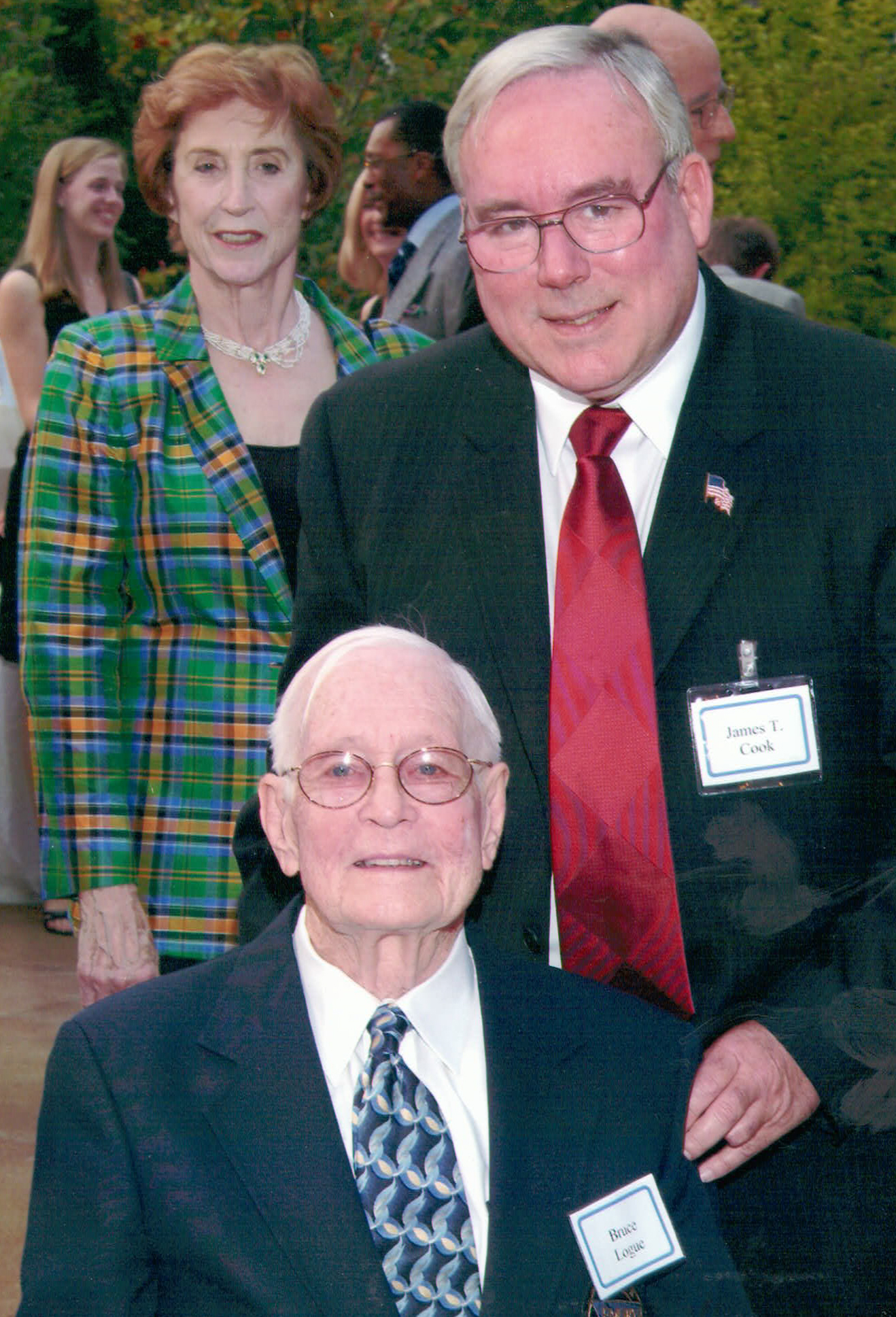When asked why he chose to make a donation at the Hurst, Logue, Wenger Cardiovascular Dinner, Emory alumnus (cardiology fellowship, 1977) James T. Cook III, MD—a cardiologist in Panama City, Florida—stated that his time at Emory was instrumental to his career development.
Before his year-long fellowship at Emory (from July of 1976 to July of 1977), Cook completed a one-year cardiology fellowship at Cincinnati General Hospital training under fellow Emory alumnus Noble O. Fowler, MD. Notably, Cook also completed his undergraduate education, medical school, and internship at Emory University.
At the time of his Emory fellowship, Cook was R. Bruce Logue, MD’s last fellow. Years earlier, in 1948, Cook’s father—a general practitioner from Marianna, Florida—had spent three months training under Logue in addition to completing his undergraduate degree, medical school (41M), and internship at Emory University. According to Cook, Hurst wrote to him asking for a copy of his referral letter (written by Fowler to Logue on Cook’s behalf) so that he would not have to cross the hall at the Emory Clinic to ask Logue.
After completing his Emory fellowship in 1977, Cook moved to Panama City to practice internal medicine and cardiology. At the time, Panama City did not have a catheterization laboratory, so Cook would fly to Sacred Heart Hospital in Pensacola in his Comanche aircraft once a week to perform catheterizations.
Cook began working with his first partner, Thompson C. Maner, MD (University of Florida) in 1980, and one year later, the two performed the first intracoronary streptokinase procedure in the Southeast. At one point, Cook says, they were performing more streptokinase than any hospital in the United States. His Panama City cardiology group has now grown to eight cardiologists (including Emory alumnus Amir Haghighat, MD) working in six catheterization labs across the city.
Discussing his continued loyalty to Emory and its missions, Cook said, “Dr. Hurst taught me the pursuit of excellence, and Dr. Logue taught me to be a complete physician. He was a great man.” Cook said he wanted to support that legacy.
The Hurst, Logue, Wenger Cardiovascular Dinner gives former fellows an opportunity to connect with current fellows, past and present cardiology faculty as well as learn about the division’s current clinical, research, and educational initiatives.
Funds donated at the Hurst, Logue, Wenger Cardiovascular Dinner will go to the Emory Cardiology Training Fund. This fund supports educational activities for clinics, research, postdoctoral fellows, and graduate students. The goal is to enhance learning experiences, improve teaching and presentation skills, and provide opportunities for networking and collaboration.
Past recipients
Girum Mekonnen (Ethiopia research exchange)
Sang-Ho Lee
American Heart Association Scientific Conference, 2014
Direct Reprogramming of Human Dermal Fibroblasts into Endothelial Cells Using a Single Transcription Factor
Jaeyeaon Cho
American Heart Association Scientific Sessions, 2014
Non-viral direct reprogramming of fibroblasts into a three dimensional vascularized cariomimetic tissue
Akram Ibrahim
Transcatheter Cardiovascular Therapeutics
Outcomes of Transcatheter aortic valve replacement (TAVR) in patients presenting circulatory shock secondary to inoperable aortic stenosis
Kiwon Ban
Biomedical Engineering Society
Engineered cell therapy with embryonic stem cell derived cardiomyocytes encapsulated in injectable nanomatric gel enhanced engraftment and promoted cardiac repair in experimental myocardial infarction
Danesh Khella
American Heart Association Scientific Session, 2014
PostTraumatic Stress Disorder Associated with Adverse Non Linear Heart Rate Variability in Veteran Twins
Brad Witbrodt
American College of Cardiology Scientific Session, 2015
Farshad Forouzandeh
American College of Cardiology Scientific Session, 2015
Cases in Many Faces: Management Risk in Unique Patient Groups with Diabetes
Mike Manogue
American College of Cardiology Scientific Session, 2015
Fit Forum Jeopardy Session Co-Chair
Muhammad Hammadah
Heart Failure Society of America, 2015
Heightened Platelet Re-activity Assessed by Increase in Mean Platelet Volume is Associated with Poor Outcomes in Stable Heart Failure Patients
Amanda James
Experimental Biology, 2015
Seven Encapsulated and nonecapsulated (iso)microRNAs in Human Samples Predict Coronary Atherosclerosis and Cardiac Events
Anita Kelkar
American College of Cardiology Scientific Session, 2015
Long term Prognostic Significance of Coronary Artery Calcium Scores in Women and Men with Low Intermediate Framingham Risk Score
Salim Hayek
American College of Cardiology Scientific Session, 2016
- High-Sensitivity Troponin-I Levels Predict Long-Term Mortality Independent of Coronary Artery Disease Severity
- A Biomarker Risk Score Incorporating Myocardial Injury, Inflammation, Coagulation and Cellular Stress Improves the Prediction of Cardiovascular Events
- Vitamin D3 Levels Modulate CXCR4+ Circulating Cell Counts
Arash Harzand
American Heart Association Scientific Session, 2016
Use of real-time feedback to improve outcomes in hospital cardiac arrest: one center’s experience
Related Links
- Emory University Department of Medicine
- Emory University Division of Cardiology
- Emory Cardiology Fellowship Program

